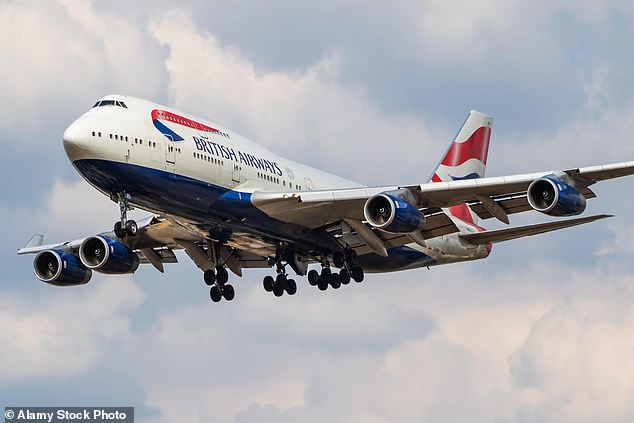End of the BA jumbo jets: British Airways scraps ENTIRE FLEET of iconic 747 planes after plummeting passenger numbers forces bosses to bring forward plan to retire them in 2024
- The nation’s flag carrier is world’s last major operator of the iconic Boeing 747
- BA used 31 jumbo jets before coronavirus crisis forced bosses to park the fleet
- It will lead to fears for jobs of more than 600 BA pilots trained to fly the 747-400
British Airways is to scrap its entire fleet of jumbo jets with immediate effect, the Daily Mail can reveal.
The nation’s flag carrier is the world’s last major operator of the iconic Boeing 747 ‘Queen of the Skies’, which has been in service with the airline since 1971.
It had 31 jumbo jets in use before the coronavirus crisis forced bosses to park the entire fleet at airports across the country.
BA had originally planned to retire them by 2024 and gradually replace them with newer, more fuel-efficient jets such as the 787 Dreamliner and Airbus A350.
But plummeting passenger numbers have forced the airline to bring forward its plans.
Few aeroplanes are as familiar as the 747, and in half a century it has transported 3.5billion passengers and billions of tons of cargo around the planet
The colossal, four-engine jets will be broken up and scrapped for parts over the next few months in what will be an ignominious end for the commercial jetliner, which once helped earn BA the title of the ‘world’s favourite airline’.
The move will lead to fears for the jobs of more than 600 BA pilots who are specifically trained to fly the 747-400.
‘It is entirely Covid-related,’ a source said tonight.
‘We don’t see passenger levels returning to normal until 2024 at the earliest and we just cannot foresee a time when we will use that size of aircraft again.
‘It is a heart-breaking day for everyone at BA and for the customers it will be awful as well.
‘This is one of the most recognisable aircraft after Concorde.
‘But this is one of the unfortunate consequences of this unprecedented pandemic.’
The last BA 747 flew on June 2 and was a repatriation flight from Cape Town to Heathrow.
The news comes days after Virgin Atlantic said it would stop using its small fleet of jumbo jets and means no British carrier now operates them.
Few aeroplanes are as familiar as the 747, and in half a century it has transported 3.5billion passengers and billions of tons of cargo around the planet.
But now it has become a symbolic victim of the crisis facing the aviation industry as a result of the global coronavirus pandemic.
A top speed of just over 650mph makes the jumbo the fastest commercial plane on the planet but it is notoriously inefficient compared with newer aircraft.
Landing a 747 at Heathrow Airport costs more than £13,000, of which nearly £4,000 is in environmental tariffs.
BA’s first 747-400 – the variant most commonly in use today – was delivered in June 1989. It flew until 2018, when it sent to a scrapyard in California.
The airline has operated 57 Boeing 747-400s, meaning that in total it has flown 100 passenger jumbos and one cargo version.
The youngest 747 in the current fleet is 21 years old.

